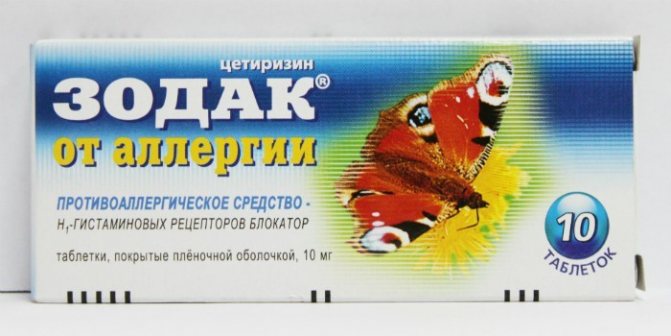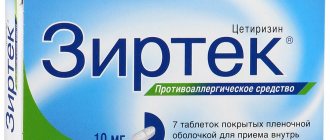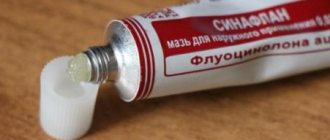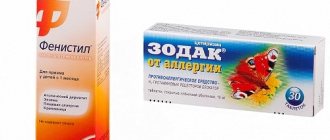The recommendations were compiled by a pediatrician - Dr. Victor Abdow Rockville, MD, USA.
Can Zyrtec be taken while breastfeeding? Is it safe for nursing mother and baby?
Zyrtec is a brand name that contains the main active ingredient in its composition: Cetirizine hydrochloride (very low risk) for more information (pharmacokinetics, links, . ) click on the name of the active ingredient. Please note: the composition of some products varies from country to country. Please make sure this is the brand name you are looking for..
Very low risk Allowed during breastfeeding. Not dangerous for the baby. more details.
Low risk Moderately safe. May be present in breast milk. Follow your doctor's advice. more details.
High risk Unsafe drug; risks must be assessed when taking it. Use safer alternatives. more details.
Very high risk Not recommended. You need to stop breastfeeding or choose a safe alternative. more details.
A woman’s immunity is weakened during pregnancy and after childbirth, and lactation requires a lot of energy. During this period, a nursing mother becomes vulnerable to infectious diseases and allergies. She suffers from rash, itching, rhinitis or conjunctivitis of allergic origin, nettle fever, edema, etc.
Allergens include foods, some medications, chemicals, plants, and animals. Special medications will help relieve unpleasant symptoms.
Zyrtec is an antihistamine that is used to eliminate symptoms of an allergic reaction. The drug blocks the release of histamine and inhibits the development of allergies.
Zyrtec while breastfeeding will help get rid of allergy symptoms. However, before using the medication, you should obtain permission from an allergist.
Zyrtec: descriptive characteristics
Composition of pharmaceutical forms:
- cetirizine;
- microscopic cellulose;
- lactose;
- pyrogenic silicon dioxide;
- magnesium stearate;
- titanium dioxide;
- hypromellose;
- macrogol 400.

- cetirizine;
- glycerol;
- propylene glycol;
- food additive E954;
- parahydroxybenzoic acid methyl ester;
- propylparabenzene;
- preservative E262;
- ethanoic acid anhydrous;
- filtered water.
The active substance inhibits the release of histamine, prevents the development of an allergic reaction and suppresses existing symptoms. After penetration into the body, cetirizine eliminates itching, reduces the amount of fluid that is released from the vessels into the tissue and provokes swelling. The drug relaxes smooth muscles, prevents skin reactions to various allergens, and reduces bronchospasm in asthma.

The therapeutic effect appears on average after 30 minutes and lasts more than a day. The drug is excreted through the kidneys.
Zyrtec is indicated in the following cases:
- Rhinitis of allergic origin, which manifests itself during the flowering period or all year round. Characteristic symptoms of the disease are itching, nasal congestion, and sneezing.
- Allergic conjunctivitis. The disease manifests itself as redness of the conjunctival membrane, itching, and excessive secretion of tear fluid.
- Seasonal or year-round rhinoconjunctivitis.
- Dermatitis of allergic origin, which manifests itself as nettle fever.
Antihistamines are used for medical reasons.
Zirtec drops - instructions for use
The drug has an antiallergic effect, helping to eliminate most symptoms. Before using the product, you should carefully study the instructions with information about indications, contraindications and method of use. Important information includes side effects. In therapeutic doses, the antiallergic drug does not have a sedative effect and does not cause drowsiness. At the same time, the components of the product impair digestion or contribute to the appearance of skin reactions.
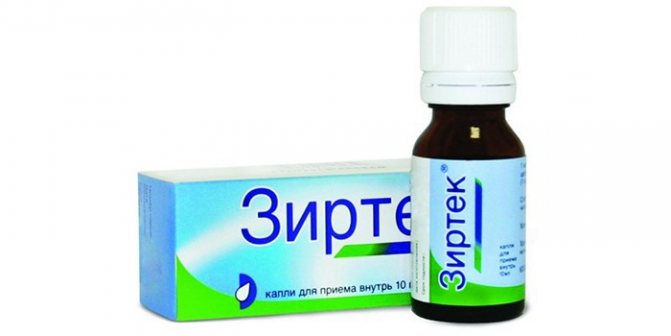
Release form and composition of the drug
Zyrtec is available in the form of drops for oral administration. The drug is a clear, colorless solution and has a faint odor of acetic acid with a bitter taste. The drops are placed in a dark glass bottle with a capacity of 10 ml. In addition to it, the cardboard box contains a dropper cap and instructions for use. The components of Zyrtec per 1 ml of product are shown in the table.
| Name | Content, mg |
| Active substances: | |
| cetirizine hydrochloride | 10 |
| Excipients: | |
| glycerol | 250 |
| propylene glycol | 350 |
| sodium saccharinate | 10 |
| methylparabenzene | 1.35 |
| propylparabenzene | 0.15 |
| sodium acetate | 10 |
| glacial acetic acid | 0.53 |
| distilled water | up to 1 ml |
Pharmacodynamics and pharmacokinetics
The antiallergic drug Zyrtec belongs to the group of selective antagonists of peripheral histamine receptors. After a course of cetirizine, no effect on brain H1 receptors was detected. The product helps eliminate the symptoms of allergic diseases, thanks to its antipruritic and antiexudative effect. At the same time, the drug has almost no anticholinergic, antiserotonin effect.
The effect of taking the drug is observed after 20 minutes of a single dose of 10 mg or 20 drops. The maximum concentration of cetirizine is reached after 60 minutes, after which the effect of the drug is observed for 24 hours. Zyrtec is quickly and completely absorbed from the gastrointestinal tract (gastrointestinal tract). Concomitant food intake does not affect the absorption of the active substance.
Indications for use
Zyrtec has an antiallergic effect, so doctors prescribe the drug to treat allergy symptoms such as itchy skin, watery eyes, and sneezing. Direct indications for taking the medicine are also: rhinorrhea, conjunctival hyperemia, swelling, irritation and skin rashes. This antihistamine is prescribed for the following diseases:
- Quincke's edema;
- hay fever (hay fever);
- seasonal allergies – allergic rhinitis, allergic conjunctivitis;
- hives;
- bronchial asthma;
- allergic dermatitis.
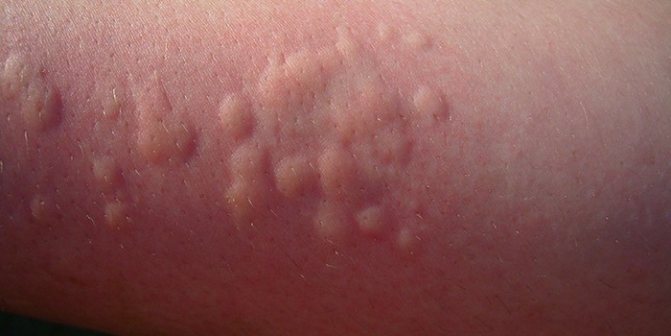
Dosage of the drug
Drops and tablets are used orally. The decision on the choice of dosage form and dose of the drug is made by an allergist based on an examination.

Portion of drops depending on the age of the patient:
- 6 – 12 months – 5 drops;
- 1 – 2 years – 5 drops once or twice;
- 2 – 6 years – 10 drops once;
- from 6 years and more - from 10 to 20 drops.
The tablet form of Zyrtec is prescribed to allergy sufferers over 6 years of age. The dose of the drug is from ½ to 1 piece per 24 hours.
Zyrtec or Zodac?
The active ingredient in both products is the same - cetirizine hydrochloride. The auxiliary components are somewhat different, but one and the second preparation do not contain sugar or dyes. You can determine which drug is better from the following conclusions:
- Zyrtec is the original drug, and Zodac is a generic drug. Zyrtec has been subjected to more rigorous medical research and more testing. And the effect of its identical development has been practically not studied.
- Zyrtec is more expensive. So, for 30 Zodak tablets you need to pay about 250 rubles, and for just 20 Zyrtec tablets you need to pay as much as 400 rubles.
- Zodak is prescribed only from 1 year of age, while Zyrtec can be taken by children from six months (according to the doctor’s testimony).
It is impossible to say which of the two drugs is better. Each has its own pros and cons. I would only like to note the fact that often allergists or pediatricians give patients the right to choose. Both drugs are well tolerated by patients, are not addictive, and both drugs have side effects.
special instructions
- Severe renal failure.
- Children up to 6 months (drops).
- Patients under 6 years of age (tablets).
- Allergy to the components of the medication.
In addition, the drug should not be taken during lactation and pregnancy.
Relative contraindications include chronic kidney dysfunction (moderate), predisposition to ischuria, and epileptic seizures. This restriction applies to elderly patients. Under the supervision of a doctor, tablets are taken for galactosemia, glucose-galactose malabsorption.
- rash, itching, swelling, anaphylaxis;
- headache, lethargy, muscle spasms, taste disorders, memory disorders, hand tremors;
- impaired consciousness, irritability, stress, mood swings;
- decreased visual acuity, nystagmus, false myopia;
- xerostomia (drying of the oral mucosa), nausea, diarrhea;
- pharyngitis, runny nose;
- weight gain, increased appetite;
- ischuria, urinary incontinence.
With an overdose, side effects become more pronounced. To relieve these symptoms, stop taking the medicine and then go to the hospital.
How to take Zyrtec
The decision to take a drug for medicinal purposes is made by the doctor. In addition, he regulates dosages in the presence of certain diseases so that the drug does not harm the body. In addition to health status, age is taken into account in elderly patients and young children. Antiallergic drops are taken orally, after dissolving the drug in water.
Zirtec drops – dosage for adults
For children over 6 years of age and adults, the antiallergic drug Zyrtec is often prescribed in a dosage of 20 drops per day. At the same time, it is recommended for adults to take the entire daily requirement at one time, and for children to divide it into 2 doses. It happens that 10 drops or 5 mg of cetirizine are enough for a child’s body to have a therapeutic effect, so you need to monitor the child’s well-being. For elderly patients, the dosage of the drug is reduced as prescribed by the doctor.
Zyrtec - dosage for children
The drug Zyrtec can be given to a child from 6 months, although many pediatricians also prescribe it to younger children, including newborns, but by lowering the dosage. Zyrtec should not be used for newborns without a doctor's prescription, which should be taken into account by parents who have learned about the effectiveness of cetirizine from the Internet and from friends. So, the method of treating allergies in young patients is as follows:
- For children from 6 to 12 months, the medication is prescribed orally, 5 drops 1 time per day;
- Zirtec drops for children from 1 year to 2 years are used in 5 pieces up to 2 times a day;
- Zyrtec for children from 2 to 6 years old is prescribed 5 drops 2 times or 10 drops 1 time per day.
Zyrtec during lactation
According to doctors, cetirizine penetrates the bloodstream, is excreted in breast milk into the baby's body, inhibits the activity of the nervous system and can cause respiratory arrest. For this reason, Zyrtec should not be used while breastfeeding.
You can take the medication only in an emergency, but only after feeding the baby. And then see a doctor. If the doctor prescribed Zyrtec to a nursing mother, then the woman should transfer the newborn to artificial nutrition for the period of treatment. You can resume lactation after completing the course of therapy.
Thus, Zyrtec is an effective but relatively safe 2nd generation antihistamine. Women with breastfeeding use medication to relieve allergy symptoms, but this is allowed only after the approval of an allergist. To avoid the negative impact of the drug on the child, a nursing mother should strictly follow the doctor's advice on taking the drug.
The drug Zyrtec during breastfeeding is prescribed when the benefit outweighs the potential harm to the child. This medicine is indicated for hay fever, urticaria, and allergic dermatosis. Animal studies have been conducted. They showed that cetrizin, which is part of Zyrtec, does not affect the development of the fetus, as well as the health of the offspring when taking the drug during lactation. Similar trials have not been conducted on humans, so it is quite difficult to answer the question of whether the drug can be taken by breastfeeding women.

How to treat allergies in a nursing mother
Breastfeeding is a wonderful period, but at the same time it can be compared to walking through a minefield, because the slightest disturbance in the mother’s diet can cause allergies in her baby.
And the mother herself at this time is not protected from such reactions, even if she has not encountered them before.
And if signs appear, you need to find out whether she can take allergy pills while breastfeeding and which ones exactly.
Why allergies may worsen after childbirth
The fact that carrying a child and the process of childbirth greatly weakened her body was probably heard by every mother - relatives, doctors, and friends. But there is no escape from this fact - despite the naturalness of the process, pregnancy really becomes a heavy burden.
It weakens many processes and functions of the body, especially the immune system. In addition, it should be understood that immediately after conception, a woman’s immunity is suppressed, because otherwise it would reject the fetus as something foreign (thanks to the father’s cells). As a result, most mothers (sometimes quite unexpectedly for themselves) develop allergies during lactation to familiar foods or things.
The third factor is the feeding process itself. It also requires the mother to fully devote her strength and resources, thereby weakening her defenses. This is especially evident if the mother is immersed in caring for the baby and forgets about herself - she sleeps little, eats poorly, and is constantly nervous.
Scientists have not yet figured out exactly why allergies appear during breastfeeding, because it is an excessive response of the immune system to an invasion, and the mother’s immune system is weakened. However, statistics stubbornly insist on their line - in most cases, immunodeficiency is accompanied by allergies.
One of the assumptions says that the cause of allergies may be a lack of fluid in the body and excess calcium. This situation is quite often observed during breastfeeding and provokes the production of histamine, the hormone “responsible” for the occurrence of allergies.
Forms of allergies during lactation
Allergies in a nursing mother take different forms. There are three main types of reaction:
- respiratory;
- gastrointestinal;
- cutaneous
There are local and general allergy symptoms. The first include allergies:
- rhinitis;
- dermatitis;
- conjunctivitis;
- otitis;
- bronchial spasm;
- urticaria, eczema.
A common symptom is a complex of several local ones. If the first signs of any of these reactions appear, you should immediately consult a doctor. If you wait until the allergy goes away on its own, you can expect serious deterioration, even leading to Quincke's edema and death.
Dermatitis, neurodermatitis
Dermatitis and neurodermatitis are one of the symptoms of allergies during lactation. They arise as a reaction to toxins accumulated in the body - due to disruption of the gastrointestinal tract, food allergies, dysbiosis or poor nutrition.
Symptoms of allergic dermatitis in a nursing mother are redness, dryness and flaking of the skin, sometimes accompanied by itching. A rash appears on the face, neck, arms, palms (less often on the legs and buttocks).
Sometimes this rash looks like youthful pimples on the face. So when they appear, you should be wary - perhaps this is not a good symptom.
Hay fever
Hay fever is a seasonal runny nose, an allergic reaction to environmental factors. It often occurs during breastfeeding, when the body is weakened, and is usually associated with the spring period, when trees and grasses begin to bloom, filling the air with pollen.
Symptoms of hay fever are similar to a common cold - headache, nasal congestion, burning in the throat, sometimes conjunctivitis, dry cough. They can be distinguished by the absence of temperature and increased symptoms after a long stay in the fresh air or even indoors, but with open windows.
Allergic rhinitis
Allergic rhinitis is quite similar in description to hay fever, but is not tied to seasonality. A runny nose can occur at any time of the year as a reaction to dust, pet hair, mold, etc.
Rhinitis itself may be accompanied by additional symptoms:
- nasal and ear congestion;
- clear watery or mucous discharge;
- itchy nose, constant sneezing;
- decreased sense of smell and sensitivity of taste buds.
In addition, allergic rhinitis can affect the eyes - they become red and watery.
Bronchial asthma
Bronchial asthma as an allergic reaction can occur due to genetic predisposition, excess weight or hormonal changes in the body.
Hormone fluctuations are something that nursing mothers have to deal with, and they are usually the cause of atopic asthma. And also – excessive physical and emotional stress, also familiar to every mother.
Asthma can also develop as a complication after acute respiratory viral infection or other respiratory diseases.
The symptoms of asthma are recognizable:
- shortness of breath, difficulty breathing;
- lump in the chest area;
- whistling sounds when breathing;
- feeling of lack of oxygen;
- dry cough.
Any of these symptoms should be a reason to pay attention to your health. They develop gradually, reaching a peak in the evening or morning, after which an attack occurs. This is a very serious illness and must be treated by an allergist.
Quincke's edema
Quincke's edema is a severe form of allergy that is very life-threatening. Like other forms, it develops due to increased sensitivity to allergens contained in food or air.
It is characterized by swelling of the face and neck, which gradually spreads to the larynx, impairing breathing. If the necessary assistance is not provided on time, death is possible.
That is why a nursing mother needs to immediately seek help for swelling of the eyelids, lips, and face as a whole.
Is it possible to breastfeed if you have allergies?
Many mothers worry that their allergies can be “transmitted” to the baby through milk, but such fear is unfounded.
The symptoms that poison the mother’s life are not transmitted to the baby during breastfeeding, but he may receive the allergen that caused her illness.
This does not mean 100% that the child will also have an allergy, but there is a possibility. After all, quite often there is a genetic predisposition to allergies.
There is even an opinion that breastfeeding with hay fever or any other form of it helps strengthen the baby’s immunity and reduces his chances of becoming allergic in the future.
If a mother takes any allergy medications, you should find out how they affect the baby and how compatible they are with breastfeeding.
Most modern drugs are relatively safe and approved for use in hepatitis B.
Only a doctor can tell you exactly what to take for allergies while breastfeeding a mother - prescribing medications on your own is dangerous for the health of the baby and the mother herself.
How can you treat allergies during lactation?
Treatment of allergies in a mother while breastfeeding involves the use of specialized antihistamines. Their choice is quite wide, but it is very important to choose anti-allergy pills that can be combined with feeding, otherwise it will have to be interrupted. And this is always stressful for both mother and baby.
Alas, official instructions for almost all antihistamines registered in Russia prohibit their use during breastfeeding.
In any case, after reading the instructions for dozens of tablets, we did not find a single drug approved for breastfeeding. However, Spanish researchers, the creators of the authoritative English-language website E-lactation to help mothers, have conducted large-scale studies.
They also checked how compatible allergy pills are with breastfeeding. It is their findings that we present here.
All allergy medications, also called antihistamines, are divided into three groups.
First generation drugs
They have a short-term effect, have a strong sedative effect, and are often addictive. Most of these drugs are not compatible with breastfeeding. These include: Suprastin. The drug has quite a few contraindications. It can reduce milk production, cause drowsiness in the mother, and negatively affect the child’s condition;
- Diazolin. The drug is not included in the international classification, and the instructions indicate the lactation period as a contraindication for use;
- Tavegil, Clemastine. It also causes severe drowsiness in mother and child, which is dangerous. He may refuse to breastfeed and fall into a stupor. If the pills are still taken, the child should not be left unattended, especially if he is sleeping;
- Diprazine. The side effects of this drug are similar to the previous ones. It is not recommended to take it during breastfeeding, but one-time use is acceptable to relieve symptoms. It is better to express the milk several times after taking it.
Second generation drugs
They have a longer action and fewer side effects. Such antiallergic drugs during breastfeeding are acceptable if the dosage and rules of administration are strictly observed.
- Alerza, Zyrtec, Letizen, Zincet, Zodak, Cetrin Cetirizine. They do not pass into milk, do not cause drowsiness, and no negative consequences of consumption have been identified.
- Alcedin is a solution for inhalation, not absorbed into the blood and milk, safe for hepatitis B;
- Loratadine, Claritin, Clarotadine, Loridine are quickly eliminated from the body and practically do not pass into milk.
- Eltset, Zenaro, Glentset, Xizal. According to the international reference book and the findings of British doctors, the drugs are considered conditionally safe. When taking them, there were no negative consequences for mother or baby.
- Terfenadine. The drug is prohibited for long-term use; it can cause nervousness and moodiness in a child. In case of heart rhythm disturbances, use is carried out under the supervision of a doctor.
- Fexadin, Allerfex, Telfast, Dinox, Fexofast. The active substances of the drugs pass into milk, but do not have a negative effect on the child, therefore they are approved for use during breastfeeding.
- Dimetindetna maleate (fenistil) is inferior in effectiveness to Zyrtec, Citrine and some others, but is approved for use even for infants from 1 month.
Third generation drugs
The most modern drugs that are transformed in the body into active metabolites. These drugs do not cause drowsiness, do not impair concentration, memory, vascular and heart function. Such allergy remedies are relatively safe for nursing mothers. These include:
- Levocytirizine. Allowed during lactation, but requires monitoring the child's reaction. If a rash appears, loss of appetite or irritability, you should stop taking the medicine and consult a doctor immediately.
- Desloratadine. The drug blocks histamine and eliminates allergy symptoms. The concentration of active substances in blood and milk is very low, so side effects are extremely rare.
- Fexofenadine. The drug is effective for 24 hours, the concentration in milk is low. It is prescribed in cases where the benefit to the mother is higher than the possible risk to the child.
But no matter how safe or familiar antihistamines are, they can only be prescribed by a doctor, after examining the patient and conducting the necessary tests!
Watch your child's reaction! Any warning signs (drowsiness, moodiness, skin, intestinal manifestations) should be a reason to discontinue the drug.
Prevention of allergies in nursing mothers
To minimize the harm from medications, it is better to take action in advance and prevent illness. To do this, you will need to implement several rules and restrictions:
- Carefully monitor your reaction to pets (birds also count) during lactation. The absence of allergies to them in the past is not a reason to skip this point. After giving birth, everything can change;
- maintaining hygiene. To prevent the accumulation of dust, you need to ventilate the rooms daily, wipe the floors, and regularly wash bed linen, toys, and curtains. And in addition, beat out carpets, remove heavy curtains, fur and woolen bedspreads and anything that may be suspected of allergenicity;
- a diet that involves avoiding food allergens. Any citrus fruits, red fruits and vegetables, honey and bee products, nuts and some types of fish are high-risk products;
Allergies can significantly reduce the comfort of life, but mom is already tired a lot. Therefore, there is no need to try to endure it, but you also cannot self-medicate - after all, the child’s health is at stake. It will be much safer and more effective to seek medical help - this will help quickly alleviate the condition and continue breastfeeding without harm to the baby.
Source: https://ProGrudnoe.ru/mama-zabolela/tabletki-pri-allergii-pri-grudnom-vskarmlivanii.html
Can I take it during lactation?
The main active ingredient is cetirizine. This substance eliminates itching well, relieves swelling, and removes fluid from tissue vessels. Taking Zyrtec is indicated in the cases listed below.
- Year-round and seasonal rhinoconjunctivitis.
- Dermatitis of allergic origin.
- Hay fever.
- Allergic rhinoconjunctivitis.
- Rhinitis of allergic origin.
The instructions indicate that taking the drug is prohibited during pregnancy and lactation. The danger of taking Zyrtec is that cetirizine could theoretically pass into breast milk. Exceeding the dosage has a negative effect on the nervous system and can even lead to respiratory arrest. It is for this reason that allergists rarely prescribe this drug to nursing women.

Zyrtec is classified as a second generation antihistamine. Zyrtec can be taken during lactation, but only as prescribed by a doctor. The manufacturer notes that when treating breastfeeding women for a month, no short-term or long-term side effects were recorded. The drug has a high ability to bind to plasma proteins, so the likelihood of a dose dangerous to the baby entering breast milk is quite low.
What antihistamines can be taken during pregnancy: list of drugs and doctors’ recommendations
According to statistics, more than 20% of the world's population suffers from various allergic reactions.
The average person does not pay much attention to allergies unless they cause severe inconvenience or a threat to life. Everything is different when it comes to a pregnant woman.
In this case, the question automatically arises: how do pregnant women tolerate allergies and how does it affect the child’s health in the future? Which antihistamines during pregnancy will not harm the health of the woman and her child?
Doctors' recommendations for allergies in pregnant women. Should I take antihistamines?
Immunologists around the world talk about the danger of the simplest, at first glance, allergy, which claims human lives every day. It's all about the microorganisms living inside a person. Those at risk primarily include people with weakened immune systems: young children, people with chronic diseases and pregnant women.
A complete medical examination and consultation is the main stage in the treatment of allergic diseases in pregnant women. To get rid of an allergy, it is necessary to find out the cause of its occurrence - the allergen, contact with which caused the reaction.
In this case, it is very important to understand what causes the allergy; perhaps it is certain foods, animal dander, or cosmetics.
After the cause of the allergy has been established, the doctor will be able to prescribe treatment, taking into account the woman’s interesting situation.
Doctors prescribe only high-quality and proven drugs that will be safe for both mother and child.
Self-medication is not the best option during pregnancy, since many popular drugs are strictly contraindicated for pregnant women.
It is worth remembering that taking antiallergic drugs during pregnancy is allowed only under constant medical supervision in order to eliminate the risk of adverse effects on the child.
Preventing allergies during pregnancy
Preventive measures to avoid allergic reactions during pregnancy are very simple - avoid contact with possible allergens. The prevention scheme is as follows:
- Remove all flowering plants from the room and limit contact with pollen (do not smell the flowers).
- Constantly ventilate the room and put mosquito nets on the windows.
- Contact with household chemicals should be completely avoided. If there is an urgent need to use it, you should put gloves on your hands and put on a gauze bandage so as not to inhale chemical fumes.
- Have less contact with pets.
- Get rid of bad habits. Smoking during pregnancy can cause serious swelling of the nasopharynx.
- Try to avoid visiting beauty salons, dyeing your hair and doing nail extensions.
- Anxiety and stress can also trigger the development of allergies. Surround yourself with positive emotions.
Important! During pregnancy, it is necessary to regularly wet clean the room, because dust is the main carrier of allergens and contributes to the development of respiratory diseases.
Are antihistamines different in the 1st, 2nd and 3rd trimester of pregnancy?
The first trimester is significant in the formation of the fetus. That is why taking antihistamines during pregnancy in the first trimester is contraindicated. The only exceptions can be those cases when the allergy poses a threat to the life and health of the mother.
The second trimester does not have serious restrictions, unlike the first. During this period of gestation, doctors prescribe anti-allergy drugs such as Zyrtec, Telfast, Loratadine, Levocetirizine. The second trimester is a surge in the sensitivity of the pregnant woman's body. It is during this period that severe allergic reactions can occur.
The third trimester is characterized by a decrease in allergic manifestations, due to dulling of receptor sensitivity. Women find it easier to tolerate all allergy symptoms.
In the 3rd trimester of pregnancy, the following antihistamines are recommended: Claritin, Parlazine, Cetirizine, Azelastine. It is worth remembering that each body is individual.
Of course, there is a general gradation of antihistamines according to trimesters, but all medications are prescribed exclusively individually, taking into account all the complications and risk factors
Approved antihistamines for pregnant women
There are three main groups of antihistamines. They all have the same principle of action and differ only in the characteristics of their effect on the body’s receptors. Histamine is a substance that provokes allergies, secreted by special receptors of three types.
Antihistamines are drugs that reduce the sensitivity of receptors, suppressing allergic manifestations. This is a very complex adaptive procedure of the human body, so taking such drugs during pregnancy should only be done under the supervision of a doctor.
Among the antihistamines that can be used during pregnancy:
Used in the treatment of rhinitis, allergic asthma, atopic dermatitis, itching. The daily dose of the drug for adults is 10 mg. You can take one 10 mg tablet before bed or 2 5 mg tablets twice with meals. The active ingredient is cetirizine, does not cause any severe side effects, and there is no sedation after administration.
The active ingredient, like the first drug, is cetirizine. But there are also excipients, such as glycerol, sodium saccharinate, sodium acetate, acetic acid.
Indications for use include diseases such as rhinitis, infectious or allergic conjunctivitis, dermatosis, urticaria, edema of the quinta.
Adults and pregnant women take 10 mg (1 tablet) once a day before bedtime.
The generic name of the drug is cytirizine (active ingredient). Additional substances in the composition: cellulose, lactose, hypromellose, polyethylene glycol, magnesium stearate. It is thanks to its additional composition that Zyrtec is recommended for pregnant women to take for allergies. The daily dose of the drug for an adult is 1 tablet (10 mg) or 10 drops.
The drug contains fexofenadine hydrochloride. The additional composition is almost identical to the drug Zyrtec. For adults, the daily dose is 1 tablet (120 mg), regardless of meals. It is very important to stick to the same time when consuming.
When thrush bothers you: Pimafucin during pregnancy - why you should choose it.
Is it possible for expectant mothers to use furatsilin, and how it can be dangerous, find out in this article.
Why you shouldn’t take Analgin: https://mamafarma.wpengine.com/pain/beremennost-i-analgin.html.
Prohibited Antihistamines during pregnancy
It is very difficult to answer the question: which antihistamines are prohibited during pregnancy, since they all have a certain number of contraindications. Some prohibited antihistamines during pregnancy include:
This remedy can be prescribed only in cases of a serious threat to the life of the mother, with Quincke's edema or inflammatory rhinitis. It's all about the active ingredient of the drug - chloropyriamine hydrochloride.
This is an active substance that can cause involuntary contractions of the uterus, which leads to premature birth. In the early stages of pregnancy, taking Suprastin can cause miscarriage.
The main contraindication during pregnancy is the powerful sedative effect that occurs after administration. The drug affects the central nervous system of a pregnant woman, dulling not only the receptors, but also all tactile sensations.
With a one-time use, nothing bad will happen, but if you take the medicine systematically, metabolic processes will be disrupted and the child will not be able to receive all the nutrients necessary for development.
In case of hypersensitivity to the components included in the drug, dizziness, vomiting, and fainting may occur. In pregnant women, nervousness increases, convulsions appear, sleep is disturbed, and in rare cases a person experiences anaphylactic shock.
This substance has a very wide range of interactions with food and other medications. That is why its use during pregnancy is extremely undesirable. The manufacturers themselves indicate pregnancy as a contraindication to the use of the drug.
Remember! The simplest allergy can cause serious health complications, especially in a pregnant woman. Treatment of allergic diseases is individual in nature, so you should not self-medicate; you must undergo a full medical examination, after which the doctor will be able to prescribe effective treatment.
The doctor will tell you how to deal with allergies during pregnancy in the video:
Source: https://mamafarma.ru/allergy/antigistaminny-pri-beremennosti.html
Safe Reception Rules
Many doctors recognize Zyrtec as an effective remedy that can successfully relieve allergy symptoms. Women during lactation are prohibited from taking the drug without consulting an allergist. Experts recommend that nursing mothers always adhere to the rules for safe use of Zyrtec.
- Do not take the drug if the child is under 6 months old.
- Strictly observe the dosage.
- If your baby has indigestion or atypical reactions, contact an allergist to change the drug.
- If a woman feels nausea, headache, or other negative reactions occur, the drug should be discontinued and consult an allergist.
- It is forbidden to take Zyrtec if you are hypersensitive to hydroxyzine, cetirizine and other components.
The question of whether a nursing woman needs antihistamines can only be answered after tests and a medical examination. It should be understood that taking Zyrtec during lactation is risky, because no studies have been conducted on humans, and it is very difficult to predict an individual reaction.
For impaired renal and liver function
Liver disease does not require dosage adjustment or discontinuation of the drug; this is only necessary if the functions of the kidneys and liver are simultaneously impaired. If we talk about taking antiallergic drops Zyrtec in the presence of kidney disease, the dependence is as follows:
- in patients with mild to moderate renal failure, no dosage adjustment is required;
- in severe cases of the disease, the dosage is regulated by a doctor;
- at the terminal (complicated) stage of renal failure, taking the drug is contraindicated.
Contraindications and side effects
Zyrtec is classified as a second-generation antihistamine; it is low-toxic and has minimal sedative effect. Nursing mothers can use this drug to relieve allergy symptoms, but this is allowed only after the approval of an allergist. The selection of a medicine should be carried out individually, taking into account the woman’s complaints.
Before use, you should read the instructions carefully. The manufacturer indicates contraindications.
- Individual sensitivity to the components of the drug.
- The last stage of renal failure.
- Pregnancy and lactation period.
- Elderly age.
- People suffering from epileptic seizures.
- Give the product with caution to children under 1 year of age.

In rare cases, Zyrtec can cause a number of side effects: anaphylactic shock, respiratory arrest, vomiting. Reactions from the nervous and digestive systems are also possible. They can manifest as headaches, cramps, nausea and vomiting. From the respiratory system, rhinitis and pharyngitis often occur.
The issue of maintaining breastfeeding should be decided on an individual basis. There have been no adequate and strictly controlled studies on the effects of the drug. In this connection, some experts recommend transferring the baby to artificial feeding until the end of the course of treatment.
Use of antihistamines during pregnancy
Allergic reactions of the immune system when interacting with a pathogen are widely manifested in the perinatal period. Thanks to modern medicine, they can be easily stopped without harm to the child.
Antihistamines are not usually used during pregnancy, but if necessary, doctors prescribe safe anti-allergy medications.
You should first familiarize yourself with the list of effective drugs, their side effects and features of use.
Mechanism of action of drugs
The pharmaceutical market offers customers 3 generations of antiallergic drugs. They have the same mechanism of action, but differ in the potency of the effect and side effects.
An allergic reaction is provoked by a pathogen, under the influence of which the body begins to produce histamine. It becomes active and allergic symptoms appear. Antiallergic drugs reduce the release of histamine and extinguish it.
Thus, clinical symptoms are eliminated.
Important! Medicines against allergic manifestations in the perinatal period can be used not only for their intended purpose, but also to eliminate insomnia, ARVI, and vomiting.
The effectiveness of relieving intolerance depends on avoiding repeated contact with the allergen.
Not a single antiallergic medication will work if the pathogen regularly affects the body.
For example, keeping a pet at home if its fur is intolerant, errors in the diet plan in case of rejection of the protective properties of certain products from the menu.
List of approved antihistamines during pregnancy
The doctor prescribes medication to correct the allergy depending on its symptoms. Antihistamines are prohibited during pregnancy in the first trimester, but in phases 2 and 3, they can be used.
Safe means:
- Suprastin - prescribed in the second trimester;
- Cromolyn sodium - brings relief from bronchial asthma, not recommended for the first 12 weeks;
- Eden, Telfast, Claritin - used if necessary;
- Diazolin - allowed for the treatment of an allergic reaction in the third trimester;
- Zyrtec - indicated during pregnancy in the 2nd and 3rd trimester, but only if the likely benefit to the mother outweighs the potential risk to the fetus.
The given list of antihistamines for pregnant women can cause atopy if they are selected incorrectly. Self-appointment is prohibited!
What antiallergic medications are prescribed in different trimesters?
In each period of gestation, only certain medications can be used.
| Trimester | What medications can you take? |
| Second . There are no strict prohibitions; most of the fetal organs are already formed. | During pregnancy in the 2nd trimester, allergy pills are prescribed : Suprastin, Levocetirizine, Zyrtec, Desloratadine. |
| Third . At the final stage of gestation, most antiallergic drugs are allowed. All organs of the fetus are formed; it is only important not to have a detrimental effect on the birth process. | What you can do for allergies during pregnancy in the 3rd trimester : Zyrtec, Azelastine, Claritin, Desloratadine. |
After assessing the woman’s condition and test results, the doctor decides which antihistamines can be used and sets the duration of the course.
Prohibited antihistamines during pregnancy
The list of allergy medications that should not be taken is wide. This is explained by their negative effect on the fetus, side effects and the lack of statistical information on tolerability during gestation. The following are prohibited products.
- Diphenhydramine - affects uterine contractions, is not prescribed throughout the entire period of gestation;
- Betadrine – cannot be used in any trimester;
- Tavegil - its use sometimes causes the development of defects in an infant, it is contraindicated;
- Claritin - when carrying an embryo, the doctor can prescribe this drug only if absolutely necessary;
- Pipolfen - should not be used during the entire period of gestation;
- Astemizole – has a teratogenic effect, prohibited;
- Ketotifen, Histaglobulin, Zafirlukast are contraindicated.
Antihistamines are practically not prescribed during pregnancy in the 1st trimester. During this period, all organs and systems are formed. Antiallergic drugs are used when the doctor sees threats to the mother's life. They are also not prescribed before birth in order to keep the baby active.
Side effects
Each remedy has a number of side effects. Medicines have a strong sedative effect, some are famous for their muscle relaxant effect. The baby may be born lethargic, preventing him from taking his first breath. This is fraught with aspiration and pneumonia. Intrauterine exposure to antihistamines can manifest itself as malnutrition of the baby, which also affects its activity.
What side effects do specific drugs cause?
- Diphenhydramine - can increase uterine tone and cause contractions;
- Terfenadine – leads to weight loss in the baby;
- Pipolfen - it is undesirable to use because of its inhibitory effect on the central nervous system;
- Betadrine – increases the risk of spontaneous abortion;
- Astemizole - affects liver function, heart rhythm, and has a toxic effect on the fetus.
If the situation allows, local and symptomatic treatment is carried out, and antihistamines are prescribed in small dosages with a limited period of consumption.
Vitamins for allergies in the perinatal period
Vitamins effectively help in the fight against the pathological condition. They should also be used in the perinatal period to replenish the lack of beneficial microelements in the body.
- Vitamin C. The microelement effectively prevents anaphylactic reactions and reduces the frequency of allergy symptoms.
- Vitamin B12. This substance is recognized as a strong natural anti-allergen, which helps in the fight against dermatosis and asthma.
- Pantothenic acid, or Vitamin B5. Shows a high effect in seasonal manifestations accompanied by allergic rhinitis.
- Nicotinamide, or Vitamin PP. The trace element alleviates spring pollen allergies.
The duration of the course of treatment depends on the intensity of the symptoms and is determined strictly individually.
Effective antihistamines: their description
Below is a description of popular antihistamines prescribed during the perinatal period. The description will help you find out the features of specific medications, become familiar with the restrictions on their use and side effects.
Suprastin
The drug is widely popular in the fight against various manifestations of intolerance. It is well tolerated and has no negative effects on the fetus.
It is not advisable to use Suprastin in the first trimester, but in other periods it is possible. Its advantages include a budget cost of 125 rubles, fast action, and effectiveness.
Among the disadvantages are side effects such as drowsiness and dryness in the oropharynx.
Diazolin
Diazolin does not have such a quick effect as Suprastin, but it effectively relieves the manifestations of chronic allergies. Diazolin does not cause drowsiness; it is prescribed in any period of gestation, except for the first 2 months. Its advantages include an affordable price - 80 rubles, a wide range of actions. Among the disadvantages, there is a short-term effect; 3 doses are required daily.
Cetirizine
Cetirizine belongs to the new generation of antiallergic medications. According to the instructions, it is not used during the perinatal and lactation periods. Due to the novelty of the product, there is no data regarding its safety.
Used in the 2nd and 3rd trimester, if necessary. The positive qualities of the medicine include a wide spectrum of action, lack of drowsiness, quick effect, taken once a day.
Among the negative aspects, its cost is 200 rubles, depending on the manufacturer.
Claritin
The active ingredient is loratadine. It is produced under different names: Claritin, Loratadine, Lomilan, Lotharen. The effect of this drug on the fetus has not been studied due to its novelty. Among the advantages of the drug are fast action, a wide range of effects, once a day dosage, and lack of drowsiness. Price – from 200 to 500 rubles.
Features of allergies in the perinatal period
Allergic signs can appear even in women who have not previously suffered from intolerance. The changes are associated with the protective properties of the body. If the expectant mother is allergic by nature, then manifestations of intolerance can be severe.
What symptoms occur when the immune system reacts inadequately to a pathogen:
In severe situations, angioedema is possible . Urgent medical attention is needed, otherwise the risk of death increases due to swelling of the airways.
Allergy prevention
To avoid allergic reactions, you must follow a number of rules. These include:
- avoidance of stressful situations, proper rest, good mood and psychological state;
- do not overeat a certain product even if there is no intolerance to it before pregnancy - due to an excess it may appear;
- the period of interaction with pets should be minimal. If you have previously had an allergy, you should give the animal to family or friends for a while;
- maintain hygiene, carry out wet cleaning every day, change bedding in a timely manner and ventilate the room;
- Closely monitor the body's reaction during the flowering period.
Pregnant women should not get pets or a new houseplant; it is better to do this after the birth of the baby.
Useful tips for avoiding allergies during pregnancy
Doctors recommend paying attention to hypoallergenic diets. They have a preventive effect.
It is better for the expectant mother to exclude foods that can cause an inadequate immune response from the food menu. These include:
Proper nutrition will help not only prevent allergic reactions, but also saturate the body with vitamins.
Source: https://allergy-med.ru/lechenie/antigistaminnye-preparaty-pri-beremennosti
Reviews
The allergist advised me to use Zyrtec because I suffered from allergic rhinitis. At the same time, I am breastfeeding my 8-month-old daughter. The doctor said that this medicine is compatible with breastfeeding. The drug itself helped relieve allergy symptoms quite quickly.
Zyrtec was suggested to me by a pharmacist because my spring allergies worsened. After some time I saw: the instructions say that the product is contraindicated during pregnancy and lactation. I made an appointment with the doctor. I hope that taking the medicine will not harm the child.
Side effects
If the specified dosages or contraindications are not observed, side effects may occur after using the drug:
- thrombocytopenia;
- dizziness;
- headache;
- excitation;
- depression;
- confusion;
- insomnia;
- fainting;
- tremor;
- nervous tic;
- tachycardia;
- rhinitis;
- pharyngitis;
- weight gain;
- nausea;
- diarrhea;
- impaired liver function;
- urinary disturbance;
- enuresis;
- edema;
- itching;
- rash;
- anaphylactic shock;
- stomach pain.
Overdose
In case of an overdose of cetirizine, it is necessary to rinse the stomach or induce vomiting. After this, it is recommended to drink activated carbon according to the instructions. There is no specific antidote. In addition, if the following symptoms occur, symptomatic treatment is carried out:
- confusion;
- dizziness;
- high fatigue;
- drowsiness;
- itching;
- tremor;
- urinary retention;
- diarrhea;
- weakness;
- tachycardia.
Analogs
If the antiallergic drug Zyrtec is not suitable in composition or price, you can choose similar drugs:
- Zodak. The drug is a complete analogue of Zyrtec. They have similar effects, pharmacokinetics, release forms, indications, contraindications and other indicators. However, before changing your antiallergic medication, you should consult your doctor. The cost of Zodak in the form of drops is 207 rubles.
- Fenistil. Dimetindene maleate is the active substance of the drug, which has antipruritic and antiallergic effects. In addition, there is a slight sedative effect. The drug in the form of drops is used for younger children, starting from 1 month, but its effectiveness is lower and the frequency of side effects is higher. In addition to drops, Fenistil is available in the form of a gel, emulsion and cream. Prices for all forms vary from 290 to 370 rubles.
- Claritin. The drug is produced on the basis of Loratadine, which effectively copes with hay fever, allergic dermatitis and chronic urticaria. Sedation, headache, and increased appetite are noted. 10 tablets cost 225 rubles, and 60 ml of syrup – 250.
- Erius. The active substance is called desloratadine and is an improved formula of Loratadine. Thus, taking the drug does not cause drowsiness, and other side effects appear only in rare cases. At the same time, the effectiveness of the product is high. Erius is available in the form of syrup and tablets, but its price is almost 2 times more than Zyrtec - 590 rubles.
